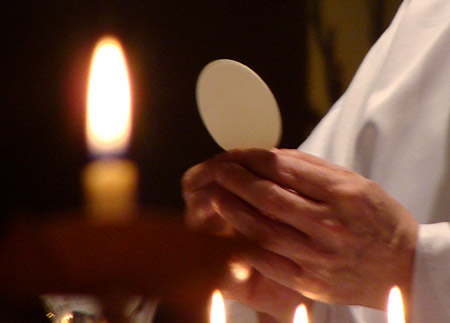How many times can Catholics receive holy communion?

Many people think they can receive Holy Communion only once a day. And many people assume that, to receive Communion, they must attend a Mass. Are these common assumptions true? And if not, how often can Catholics receive Holy Communion and under what conditions?
Communion and Mass
The Code of Canon Law, which regulates the administration of the sacraments, observes (Canon 918) that "It is highly recommended that the faithful receive holy communion during the Eucharistic celebration [that is, the Eastern Mass or Divine Liturgy] itself". But the Code immediately notes that Communion "must be administered outside the Mass, however, to those who request it for a just cause, observing the liturgical rites". In other words, while participation in a Mass is desirable, it is not necessary to receive Communion.You can enter Mass after Communion has begun to be distributed and go up to receive. In fact, since the Church wishes to encourage frequent Communion, in past years it was common for priests to distribute Communion before Mass, during Mass and after Mass in areas where there were those who wished to receive Communion every day but not they had time to attend Mass, for example in working-class neighborhoods in cities or in rural agricultural areas, where workers stop to receive Communion on their way to their factories or fields.
Communion and our Sunday duty
It is important to note, however, that receiving Communion in and of itself does not satisfy our Sunday duty to attend Mass and worship God. For this, we must attend a Mass, whether or not we receive Communion. In other words, our Sunday duty does not require us to receive Communion, therefore the reception of Communion outside Mass or in a Mass in which we did not participate (being, say, arrived late, as in the example above) would not satisfy our Sunday duty. Only attending a mass can do it.
Communion twice a day
The Church allows the faithful to receive Communion up to twice a day. As canon 917 of the Code of Canon Law observes, "A person who has already received the Holy Eucharist can receive it a second time on the same day only in the context of the Eucharistic celebration in which the person participates ..." The first reception can be in any circumstance, including (as discussed above) walking in a Mass already in progress or participating in an authorized Communion service; but the second must always be during a mass you attended.
This requirement reminds us that the Eucharist is not simply food for our individual souls. It is consecrated and distributed during the Mass, in the context of our community adoration of God. We can receive Communion outside the Mass or without attending a Mass, but if we wish to receive more than once a day, we must connect to the wider community : the Body of Christ, the Church, which is formed and strengthened by our common consumption of the Eucharistic Body of Christ.
It is important to note that canon law specifies that the second reception of Communion in a single day must always be in a Mass in which one participates. In other words, even if you received Communion at Mass earlier in the day, you must receive another Mass to receive Communion a second time. You cannot receive your second Communion on a day outside a Mass or in a Mass that you did not attend.
A further exception
There is a circumstance in which a Catholic can receive Holy Communion more than once a day without attending a mass: when he is in danger of death. In this case, where participation in the Mass may not be possible, Canon 921 notes that the Church offers Holy Communion as a viaticum, literally "food on the street". Those in danger of death can and must receive Communion frequently until this danger passes.